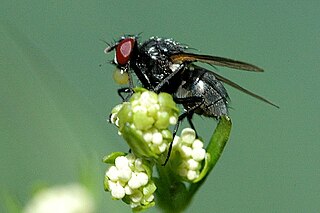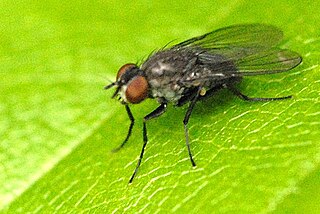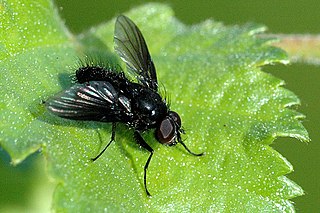
Helina is a very large genus from the fly family Muscidae.

The Anthomyiidae are a large and diverse family of Muscoidea flies. Most look rather like small houseflies. Most species are drab grey to black. Many Pegomya are yellow, and some members of the genera Anthomyia and Eutrichota are patterned in black-and-white or black-and-silvery-grey. Most are difficult to identify, apart from a few groups such as the kelp flies that are conspicuous on beaches.

Delia flies are members of the Anthomyiidae family within the superfamily Muscoidae. The identification of different species of Delia can be very difficult for non-specialists as the diagnostic characteristics used for immature and/or female specimens may be inconsistent between species. Past taxonomic keys were not as comprehensive in their identification of Delia specimens; they were either too reliant on genetic characteristics, focused solely on a specific life stage, or were focused only on certain species. However current taxonomic keys aim to be more thorough by not only including morphological diagnostics for males, females, and immature specimens of various species, but also their genetic make-up or molecular barcode.

Pegomya is a genus of flies within the family Anthomyiidae. Some species are considered pests due to their leafmining larvae. Species include:

Fannia is a very large genus of approximately 288 species of flies. The genus was originally described by the French entomologist Jean-Baptiste Robineau-Desvoidy in 1830. A number of species were formerly placed in the genus Musca.

Hydrotaea is a genus of insects in the housefly family, Muscidae. They occur in most regions of the world but are more populous in warmer climates. They are often found on feces in summer months, and are therefore generally found in close proximity to livestock. Among the 130 known species in this genus, one of the most commonly recognized is the dump fly.

Thricops is a genus of true flies of the family Muscidae.

Coenosia is a very large genus of true flies of the family Muscidae. Coenosia are known as tiger flies since they are predators and hunt many kinds of insects and other invertebrates.

Spilogona is a very large genus of flies from the family Muscidae.

Mydaea is a large genus from the fly family Muscidae.
Caricea is a genus of house flies, in the family Muscidae. There are at least 30 described species in Caricea.

Leucophora is a genus of root-maggot flies in the family Anthomyiidae. There are at least 60 described species in Leucophora.

Fucellia is a genus of seaweed flies in the family Anthomyiidae. There are at least 20 described species in the genus Fucellia.

Scathophaginae is a subfamily of dung flies in the family Scathophagidae. There are at least 30 genera and 130 described species in Scathophaginae.

Cordilura is a genus of dung flies in the family Scathophagidae. There are more than 90 described species in Cordilura.

Egle is a genus of willow catkin flies in the family Anthomyiidae. There are at least 40 described species in Egle.

Hylemya is a genus of root-maggot flies in the family Anthomyiidae. There are at least 30 described species in Hylemya.

Alliopsis is a genus of root-maggot flies in the family Anthomyiidae. There are at least 70 described species in Alliopsis.

Neodexiopsis is a genus of house flies, insects in the family Muscidae. There are at least 80 described species in Neodexiopsis.

















